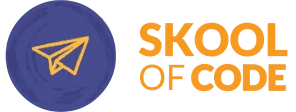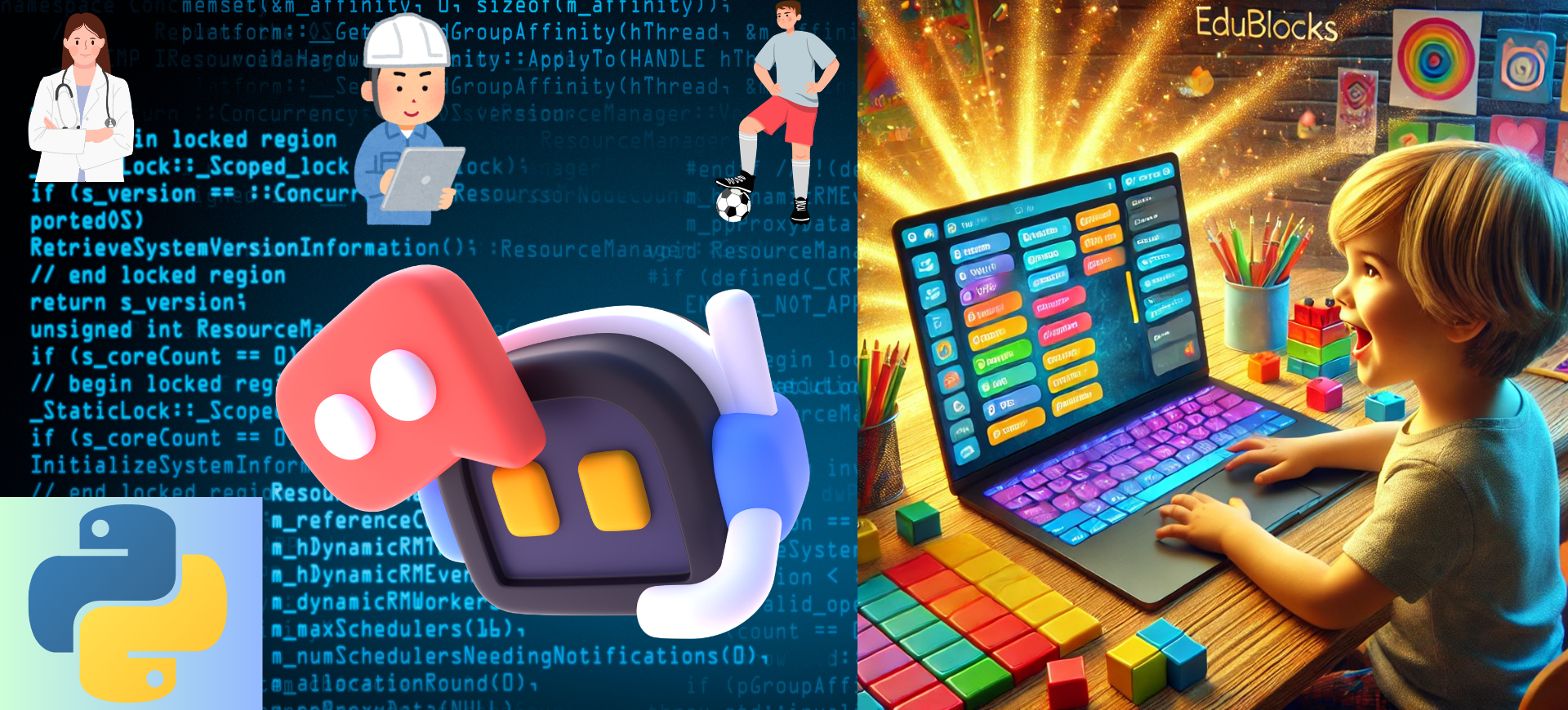Teaching coding to children has become more important as the digital age progresses. Beyond the technical proficiency required to operate in a world powered by technology, coding equips children with problem-solving abilities, critical thinking, and creativity. EduBlocks, an easy-to-use platform that helps kids learn Python through a block-based interface, is an excellent tool for young learners. However, EduBlocks offers much more than just programming knowledge. Through projects like “Choose Your Profession,” where students can simulate careers such as doctors, teachers, and police officers, EduBlocks teaches essential life skills like empathy, decision-making, and communication.
This blog will explore how EduBlocks and Python help kids learn to code while developing soft skills like empathy and creativity. Specifically, we’ll look at how creating chatbot simulations of professions fosters these abilities and why it’s important for the overall growth of young learners.
The Importance of Teaching Coding to Kids
Before diving into the specifics of EduBlocks and Python, let’s first understand why teaching coding to kids is so essential:
- Logical Thinking: Coding trains children to think logically and systematically. They learn to break down complex problems into smaller, manageable tasks—a valuable life skill in any career.
- Creativity: Coding opens doors to creative thinking. From designing games to building chatbots, kids can bring their ideas to life.
- Problem-Solving: Every line of code presents a problem to be solved, teaching perseverance and resilience.
- Career Preparedness: As more jobs in the future will require a working knowledge of technology and programming, learning to code early gives kids a head start.
EduBlocks enhances these skills with a unique approach: its block-based interface simplifies Python coding for younger students, helping them focus on the logic without getting overwhelmed by syntax. As a result, students feel confident and excited to learn.
What is EduBlocks?
EduBlocks is a visual programming tool that allows children to learn Python by dragging and dropping code blocks, making the process similar to Scratch but with Python code underneath. This visual approach to coding removes the intimidation of text-based coding while still teaching the underlying concepts of Python programming. Students can create fun and interactive projects that gradually introduce them to more advanced topics as their skills improve.
One of the standout projects in EduBlocks is “Choose Your Profession,” where students can build a chatbot simulation for different professions like doctors, teachers, and police officers. This project goes beyond coding and enters the realm of real-world skill development, as it requires students to understand the roles and responsibilities of these professions while designing their chatbot.
The “Choose Your Profession” Project
In the “Choose Your Profession” project, students create an interactive chatbot that assumes different personas based on the profession they select. The chatbot asks users questions based on the selected profession—whether it’s a doctor asking about symptoms, a teacher understanding a student’s learning challenges, or a police officer gathering details of a crime.
How the Project Works:
- Greeting: The chatbot welcomes the user and introduces itself.
- Questions: The chatbot asks relevant questions based on the profession chosen. For example, a doctor might ask about symptoms, medical history, and lifestyle habits, while a teacher might inquire about a student’s learning style.
- Variable Updates: The chatbot stores the user’s responses in variables, allowing the program to “remember” key information.
- Output: The chatbot then provides a summary or response based on the user’s input, offering potential diagnoses, study tips, or crime-solving advice.
This project is an exciting and educational way for students to apply their Python skills while simulating real-world scenarios. More importantly, it’s a tool for developing a deeper understanding of empathy, decision-making, and innovative problem-solving.
Promoting Empathy Through Chatbots
One of the most significant benefits of the “Choose Your Profession” project is the development of empathy. In traditional coding projects, the focus is often on building and executing functional code. However, the “Choose Your Profession” project requires students to think about others’ experiences and challenges. For instance, when coding a doctor chatbot, students must consider what questions a doctor might ask to understand a patient’s needs, and why those questions are important for helping them.
Empathy in Action:
- Doctor Chatbot: A doctor needs to gather detailed information from patients to make an accurate diagnosis. By coding a doctor chatbot, students think from the perspective of both the doctor and the patient. What would a patient be worried about? What might they feel embarrassed or anxious to talk about? These considerations help children practice empathy.
- Teacher Chatbot: A teacher’s role is to help students overcome learning challenges. When coding a teacher chatbot, kids must think about different learning styles and difficulties a student might face. By understanding and addressing these issues through the chatbot’s questions, children practice putting themselves in someone else’s shoes.
- Police Officer Chatbot: A police officer must gather details to solve a crime. By coding this scenario, students consider the sensitivities of those involved, including victims and suspects, fostering an understanding of how emotions and facts intertwine in high-stress situations.
Why Empathy is Important:
Empathy is a crucial life skill. It enables individuals to connect with others on a deeper level, understand their perspectives, and make better decisions that take into account the feelings and needs of others. By simulating professions that require empathy, EduBlocks helps students develop this skill early in life, which will be invaluable as they grow and interact with the world.
Encouraging Creativity and Innovation
The “Choose Your Profession” project also fosters creativity and innovation. Designing a chatbot for different professions requires students to think critically about each role’s unique challenges and how they can use code to address these issues. Whether it’s designing an interaction for a doctor or a teacher, students must come up with innovative ways to make the chatbot both functional and engaging.
Problem-Solving Through Creativity:
- Creative Questioning: When building their chatbot, students must decide what questions are most relevant for each profession. What does a doctor need to know to make a diagnosis? What information can a police officer use to solve a crime? This requires students to think creatively about what information is essential and how to ask for it efficiently.
- Designing Dialogue Flow: Creating an interactive chatbot is not just about coding; it’s about designing a conversation that flows naturally. Students must structure the chatbot’s questions and responses in a way that feels conversational, which encourages creativity in the coding process.
Promoting Innovation:
By introducing kids to the idea that coding can be used to simulate real-world scenarios, EduBlocks encourages them to think of creative ways to apply their coding knowledge to solve everyday problems. This not only makes learning more engaging but also prepares them to approach future challenges with an innovative mindset.
Enhancing Decision-Making Skills
Another benefit of this project is its focus on decision-making. Whether coding a doctor chatbot that provides potential diagnoses or a teacher chatbot offering study tips, students must make decisions about how their chatbot will interact with the user based on the information it gathers. They must also decide what kind of output or solution the chatbot should provide, encouraging them to think critically and make informed choices.
Decision-Making in Action:
- Doctor Chatbot: After gathering information about symptoms, the doctor chatbot needs to decide what the likely diagnosis might be or what advice to offer. This teaches students to weigh different possibilities before arriving at a decision.
- Teacher Chatbot: Similarly, the teacher chatbot must assess the student’s learning style and challenges before offering study tips. This requires thoughtful decision-making, as the chatbot must analyze the provided information to give meaningful advice.
By simulating professions where decision-making is a key component, students not only improve their coding skills but also learn how to make informed decisions based on collected data—a crucial skill for any profession.
Bridging Technology and Human Connection
As technology becomes more integrated into everyday life, children need to understand how to bridge the gap between technology and human interaction. The “Choose Your Profession” project teaches students that technology, while incredibly powerful, should also be used to enhance human experiences. Coding a chatbot that asks thoughtful questions and provides meaningful responses simulates real human interactions, helping students see the value in using technology to foster connection rather than replace it.
Humanizing Technology:
- Conversational AI: By building chatbots that replicate human conversations, students learn how to make technology more relatable and user-friendly. This is a vital skill in an era where AI is becoming increasingly prevalent in customer service, healthcare, education, and more.
- Ethical Considerations: As students simulate professions where trust and ethics are essential (like doctors and police officers), they understand how technology should be used responsibly, focusing on helping rather than harming.
SkoolOfCode: Engaging Students Through Interactive Learning
In online coding classes for kids at SkoolOfCode, we believe that coding is not just about learning syntax or mastering programming languages; it’s about developing well-rounded individuals who can solve problems, empathize with others, and think creatively. Through interactive projects like “Choose Your Profession,” we are engaging students in meaningful learning experiences that go beyond technical skills.
Holistic Learning at SkoolOfCode:
- Real-World Applications: By allowing students to simulate professions, we connect coding to real-world applications. This makes learning more relatable and exciting, keeping students engaged and motivated.
- Skill Development: Through these projects, we help students develop not only coding skills but also soft skills like empathy, communication, and decision-making. This holistic approach ensures that our students are prepared for future challenges—both in their careers and in life.
- Innovative Problem-Solving: Our interactive projects encourage students to think outside the box and come up with creative solutions to real-world problems. Whether they’re designing a chatbot or coding a game, we provide them with the tools to be innovators and problem-solvers.
At SkoolOfCode, we aim to make learning fun, engaging, and meaningful. By focusing on holistic development, we help students become confident coders and thoughtful individuals who can make a positive impact on the world around them.
Conclusion: Coding for Life Skills
The “Choose Your Profession” project in EduBlocks is an excellent example of how coding can go beyond the technical aspects and teach life skills such as empathy, creativity, decision-making, and communication. By simulating real-world professions, students not only develop their Python programming abilities but also learn how to understand others’ challenges and use innovative thinking to solve problems.
At SkoolOfCode, we empower young learners by offering a platform that bridges the gap between coding and meaningful life skills. In doing so, we prepare students not just for future careers in technology but for any path they choose to pursue. Through projects like this, coding becomes a tool for understanding the world, fostering empathy, and solving real-world problems—making it an essential part of modern education.
As educators and parents, investing in platforms like EduBlocks through SkoolOfCode helps children develop these well-rounded abilities, giving them the best of both worlds: technical prowess and emotional intelligence. So, why wait Book a free trial class and start your child’s coding journey today.
By –Dr. Kadam Bhambari, an Educator at SkoolofCode with Ph.D. and MTech in Electronics. She is an expert in micro:bit, Arduino, and Artificial intelligence.

